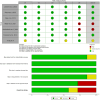Impacts of digital social media detox for mental health: A systematic review and meta-analysis
- PMID: 39280291
- PMCID: PMC11392003
- DOI: 10.52225/narra.v4i2.786
Impacts of digital social media detox for mental health: A systematic review and meta-analysis
Abstract
The impact of social media has been significant on various aspects of life, particularly mental health. Growing concerns about the adverse effects of social media use have prompted the exploration of experimental interventions, defined as digital detox interventions. However, it remains unclear whether digital detox interventions are effective for mental health outcomes. The aim of this study was to provide comprehensive insights into the effects of digital detox interventions on various mental health outcomes, including depression, life satisfaction, stress, and mental well-being. Following the PRISMA guidelines, systematic searches were carried out in online databases, including PubMed and ScienceDirect, within the publication range of 2013 and 2023. A total of 2578 titles and abstracts were screened, and 10 studies were included in the analysis. A risk of bias assessment was conducted using RoB 2.0 and the Newcastle-Ottawa scale, while statistical analysis was conducted using RevMan 5.4.1. Our data indicated a significant effect of digital detox in mitigating depression with the standardized mean difference (SMD: -0.29; 95%CI: -0.51, -0.07, p=0.01). No statistically significant effects were discerned in terms of life satisfaction (SMD: 0.20; 95%CI: -0.12, 0.52, p=0.23), stress (SMD: -0.31; 95%CI: -0.83, 0.21, p=0.24), and overall mental well-being (SMD: 0.04; 95%CI: -0.54, 0.62, p=0.90). These data underscore the nuanced and selective influence of digital detox on distinct facets of mental health. In conclusion, digital detox interventions significantly reduce depressive symptoms, suggesting that intentional reduction or cessation of digital engagement may help alleviate contributing factors. However, no statistically significant effects were observed in mental well-being, life satisfaction, and stress. This discrepancy may be due to the complex nature of these constructs, involving various factors beyond the scope of digital detox interventions.
Keywords: Digital detox; depression; effectiveness; mental health; social media use.
© 2024 The Author(s).
Conflict of interest statement
All the authors declare that there are no conflicts of interest.
Figures







References
-
- Elhai JD, Levine JC, Alghraibeh AM, et al. . Fear of missing out: Testing relationships with negative affectivity, online social engagement, and problematic smartphone use. Comput Hum Behav 2018;89:289–298.
-
- Yang J, Fu X, Liao X, et al. . Association of problematic smartphone use with poor sleep quality, depression, and anxiety: A systematic review and meta-analysis. Psychiatry Res 2020;284:112686. - PubMed
Publication types
MeSH terms
LinkOut - more resources
Full Text Sources
Medical
